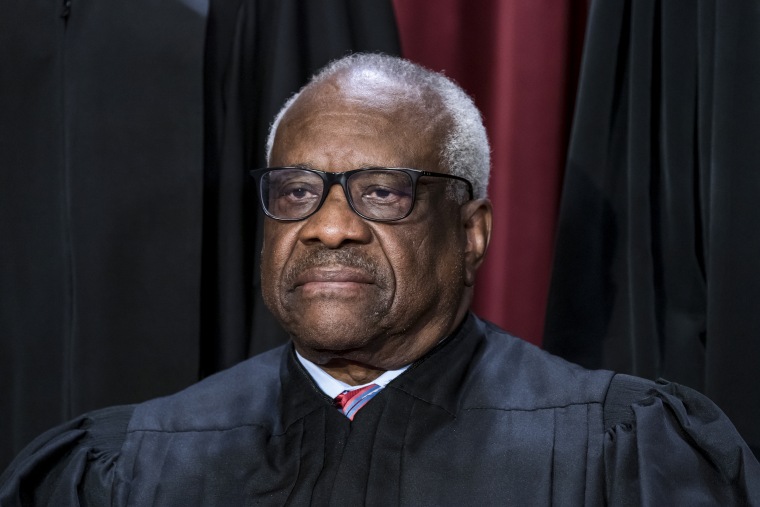WASHINGTON — For many years, a loophole that allowed Supreme Court justices to avoid disclosing certain gifts — including travel — funded by their friends was apparently big enough to fly a private jet through.
The federal judiciary just last month announced in a letter to lawmakers that it had tightened its rules for what judges and justices need to include in annual financial disclosure statements.
That tweak was made just weeks before a ProPublica article published Thursday detailed extravagant trips that conservative Justice Clarence Thomas allegedly took that were funded by conservative billionaire and Republican donor Harlan Crow.
Thomas did not disclose these trips — allegedly including travel in Crow's private jet and visits to a private resort in upstate New York — on his annual financial disclosure statements. Under the rules that existed until recently, he may not have been required to.
"In my view, before the recent amendments, the situation was sufficiently vague to give Thomas a basis to claim that reporting was not required," said Stephen Gillers, an expert on judicial ethics at New York University School of Law. "I think that such an interpretation would be a stretch ... but the interpretation is plausible."

The "personal hospitality" exemption means judges and justices don’t have to disclose certain gifts, including accommodations and food, when the person involved is a friend. The new interpretation made it clear that travel by private jet and stays at resort-type facilities owned by private entities have to be disclosed. That would appear to cover trips ProPublica said Thomas has taken to the private resort Crow owns in upstate New York, as well as travel on the donor's jet. NBC News was not immediately able to confirm the details of ProPublica's reporting.
ProPublica reported that it "uncovered the details of Thomas’ travel by drawing from flight records, internal documents distributed to Crow’s employees and interviews with dozens of people ranging from his superyacht’s staff to members of the secretive Bohemian Club to an Indonesian scuba diving instructor."
The article does not allege that Crow asked for anything in return from Thomas, which would constitute quid pro quo corruption. The news outlet also said Thomas did not respond to a detailed list of questions. Crow said in a statement issued to ProPublica and subsequently obtained by NBC News that he has never sought to influence the justice. The Supreme Court did not immediately respond to requests for comment.
Charles Geyh, a professor at Indiana University Maurer School of Law, said whether or not Thomas should have disclosed the gifts, the larger concern is a judge accepting hospitality of such value.
"Thomas and Crow were not childhood friends. They met when Thomas was on the Supreme Court, when the justice had to understand that Crow’s interest in bringing Thomas into the fold of friends who enjoyed such lavish treatment was attributable to his status as a judge," he said.
Thomas has been the focus of much scrutiny in recent months, largely driven by the actions of his wife, Virginia “Ginni” Thomas, including her support for former President Donald Trump’s efforts to overturn the 2020 election results. Thomas himself faced criticism for failing to step aside from cases involving Trump and the election.
The Supreme Court has a 6-3 conservative majority that has angered liberals by dramatically shifting American law to the right, most notably with its ruling last year that overturned the 1973 Roe v. Wade decision that said women had a constitutional right to obtain abortions.
More broadly, the latest attention on Thomas draws attention to how the Supreme Court justices are generally left to police themselves when it comes to ethics issues. The justices are facing increasing pressure to adopt a formal code of ethics similar to the one that binds lower court judges.
So far, the justices have held firm, even though district court and appeals court judges are bound by a judicial ethics code. Among other things, it requires judges to “avoid impropriety and the appearance of impropriety in all activities.” If judges breach the code, they can be investigated and reprimanded through a separate complaint process.
The justices say they follow the spirit of the code, introduced in 1973, but they have never formally adopted one of their own. There is also no procedure that allows for complaints to be investigated short of the drastic step of impeachment. Members of Congress have introduced legislation requiring the justices to adopt a code, although there are questions as to whether it could be enforced.
Thomas' actions in allegedly accepting such largesse from Crow could be seen as violating the code of conduct that applies to lower court judges, Geyh said.
For those calling for stricter ethics rules, the ProPublica report is a sign that the current system doesn’t go far enough.
"The highest court in the land shouldn't have the lowest ethical standards," Senate Judiciary Committee Chair Dick Durbin, D-Ill., said in a statement Thursday. Thomas' alleged behavior was "simply inconsistent with the ethical standards the American people expect of any public servant, let alone a justice on the Supreme Court," he added.
Rep. Alexandria Ocasio-Cortez, D-N.Y., tweeted that Thomas should be impeached and removed from office.
Gabe Roth, executive director of ethics watchdog Fix the Court, said that judges and justices need similar disclosure rules to those that bind members of Congress. A judicial ethics office should be set up to approve trips in advance, whoever is footing the bill, he added, and reports should be required within 30 days.
“It’s clear that the personal hospitality rules the judiciary adopted last month do not go far enough,” he said.
